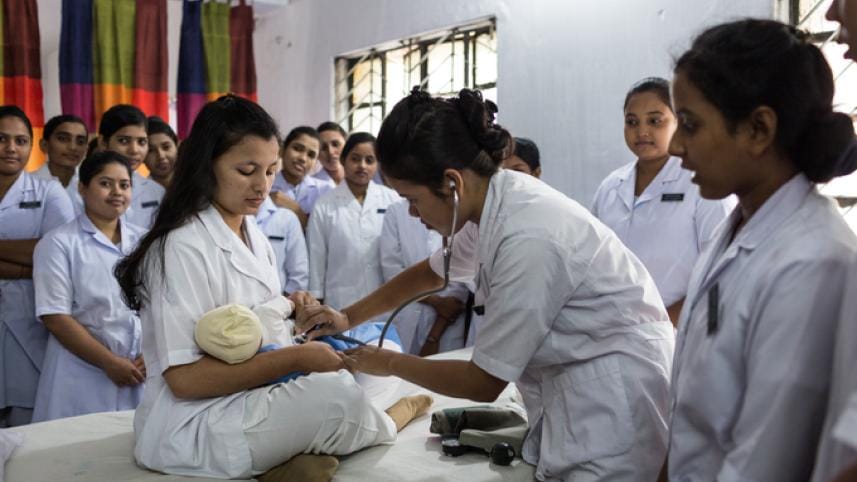Saving lives with quality care

Today we celebrate International Day of the Midwife, this year on the theme "Midwives Leading the Way with Quality Care."
It resonates with the remarkable efforts and progress that Bangladesh has made in rolling out and accelerating the midwifery profession, thereby making a critical contribution to the health of women and newborns. In fact, in the past two decades, the maternal mortality rate has been reduced by more than 50 percent in Bangladesh.
The midwifery programme in Bangladesh—which includes midwifery education, training and employment—is rooted in the Prime Minister Sheikh Hasina's 2010 commitment, as part of the UN Secretary General's Every Woman, Every Child Initiative. Bangladesh's midwifery programme is a joint effort made possible by partnerships between the government, UNFPA, civil society, and the support of many development partners such as the governments of Canada, Sweden and the United Kingdom.
But still, close to 6,000 women die every year from preventable, pregnancy-related causes in Bangladesh. Midwives will be key to getting maternal deaths to zero as key actors in the country's health strategy.
Indeed, research has shown that midwives can avert around two-thirds of all maternal and newborn deaths.
Still, many births (around 63 percent) occur in homes. It is important that women are encouraged and do seek midwives during their pregnancy, for their delivery, and when the baby is born.
Worldwide, well-educated, skilled and supportive midwives can provide over 87 percent of all sexual and reproductive health services, including care for mothers and babies during pregnancy and childbirth, counselling on family planning, screening for cervical cancer, managing sexually transmitted infections such as HIV, and more.
There are currently 1,880 registered diploma midwives in Bangladesh who have completed a three-year midwifery course. What's more, there are 1,600 nurse-midwives who have become Certified Midwives by completing a course to bring their capabilities up to international midwifery standards. These, along with a Master's programme are some of the higher educational opportunities now available to women and girls through the midwifery profession.
To give an example, professional midwives such as Ankhi Mandal, working at BoalmariUpazila Health Complex,are stepping into their leadership role in reducing maternal and infant deaths.
Ankhi expresses that in addition to her motivation for providing lifesaving reproductive healthcare, that becoming a certified midwife through midwifery education atDhaka Nursing College was a dream opportunity for her. She shares,"When a new baby comes to the world by my hands, that feeling I can't express in words and often my eyes become wet with tears of happiness."
Midwives are also role models in their communities and societies at large. The midwifery profession empowers women economically, and opens new opportunities for women to enter the labour market as wage earners.
Building on its strong growth and achievements, Bangladesh is rapidly moving towards becoming a "Developing Country." As we applaud this achievement, we also need to harness energy to solve and fill the remaining gaps, including securing maternal and newborn health now and in the future.
The greatest remaining challenges in reducing maternal and newborn mortality are low access to health facilities and skilled birth attendants, such as midwives and doctors, and women's current health-seeking behaviour. As mentioned, women, who are furthest left behind in society, have particularly low access to health services.
To address these issues, the government supported by UNFPA are working tirelessly to provide quality sexual and reproductive health care throughout the country—one of the ways being through educating and deploying midwives. With midwives, more women will have access to lifesaving care, ensuring equity in health care services for all. Innovations to enhance the quality of care are also being rolled out. One example is the recently launched e-partograph that midwives will manage, and that can further support their work.
Midwives have been deployed to remote rural health facilities as well as to humanitarian crises including floods, cyclones and influxes of refugees and displaced persons. Indeed, babies are born everyday, even in crises. Highly dedicated midwives have served with compassion in Cox's Bazar, supporting women in need.
In order for Bangladesh to achieve the best health outcomes and the Sustainable Development Goals' targets 3 and 5, related to reducing maternal mortality, promoting gender equality, and ensuring universal access to sexual and reproductive health services, midwives must be an integral part of the whole health care system and available everywhere—from public to private facilities, from communities to referral hospitals. In fact, recently deployed midwives in SreemongolUpazila Health Complex send the strong message that midwives shouldbe posted at every facility, and enabling environments need to be created at all facilities for health care service providers to work together as a team in delivering maternal health.
Bangladesh's current health care policies set a clear agenda for midwives to take the lead in providing maternal and newborn health care. In order for midwife-leaders to bring about the needed transformations, enabling environments must be assured. Midwives need to be recognised as autonomous experts when caring for women, operating in safe workspaces, and functioning as part of a team to ensure rapid emergency response for those with life-threatening complications.
Every day, midwives are bringing lifesaving health services to all women, particularly to vulnerable women and girls, promoting gender equality and ensuring no one is left behind. They are real proof and realisation of both the SDGs in action as well as UNFPA's mandate of ensuring reproductive health and rights for all.
UNFPA would like to commend the government of Bangladesh, in particular the Ministry of Health and Family Welfare, for its hard work and dedication in promoting the health of girls, women, mothers, and newborns by ensuring a strong midwifery profession to safeguard good health for all. In addition, UNFPA thanks all of the midwives who have bravely stepped forward to fulfil leadership roles for women's empowerment.
Dr Asa Torkelsson is UNFPA Bangladesh Representative.



Comments